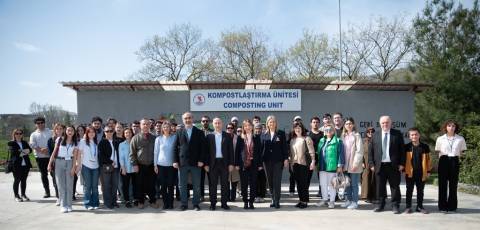Prof. Dr. Ardalı Warns: "By 2050, Our Planet May No Longer Be Enough"
Ondokuz Mayıs University (OMU) Faculty of Engineering, Department of Environmental Engineering faculty member Prof. Dr. Yüksel Ardalı stated that only 33% of the 2.1 billion tons of solid waste generated worldwide each year is managed correctly and that waste contributes to problems such as carbon emissions, biodiversity loss, and deforestation.
According to the United Nations Environment Programme (UNEP), over 500 million tons of plastic were used last year, generating an estimated 400 million tons of plastic waste.
Based on data from the online statistics portal World Population Review, China ranked as the world's largest plastic consumer in 2023, with 37.6 million tons. It was followed by the United States with 22.8 million tons, India with 7.4 million tons, Brazil with 4.9 million tons, Mexico with 4 million tons, Japan with 3.8 million tons, Germany with 3.6 million tons, Indonesia with 3.36 million tons, Thailand with 3.35 million tons, and Italy with 3.33 million tons. Türkiye ranked 34th, consuming 938,000 tons of plastic.
The country with the most unmanaged waste was India, with 7.3 million tons, followed by China (6.5 million tons), Brazil (4.8 million tons), Indonesia (3.31 million tons), Thailand (3.3 million tons), Russia (3.1 million tons), Mexico (2.7 million tons), the United States (2 million tons), Saudi Arabia (1.5 million tons), and the Democratic Republic of the Congo (1.1 million tons). Türkiye ranked 32nd with 451,000 tons of unmanaged waste.
"By 2050, This World Will No Longer Be Enough for Us"
Speaking to an Anadolu Agency (AA) correspondent about global waste production and recycling efforts, Prof. Dr. Yüksel Ardalı defined waste as materials that have reached the end of their useful life or are no longer needed due to daily life or production activities. She stated that when waste is released into the environment, it becomes garbage, leading to environmental pollution and the depletion of natural resources. He noted that waste can originate from households, industries, electronics, healthcare, and agriculture.
Ardalı emphasized that the foundation of growing waste problems lies in the "take-make-dispose" culture, stating:
“By 2050, this world will no longer be enough for us; we will need another planet. Humanity currently produces between 2.1 and 2.3 billion tons of solid waste annually. Approximately 2.7 billion people lack access to waste collection services, with 2 billion of them living in rural areas. According to World Bank 2023 data, only 33% of the 2.1 billion tons of solid waste generated yearly is adequately managed. If this trend continues, projections indicate that waste generation will reach 3.4 billion tons by 2050.
In Türkiye, according to Turkish Statistical Institute (TÜİK) data, the total waste generated in 2022—including both household and industrial waste—was 109.2 million tons. Of this, 24.9 million tons were classified as hazardous waste, while 32 million tons fell under the category of household waste.”
Ardalı explained that the waste recycling process should be based on a monthly collection system, followed by cleaning and pre-processing, shredding and grinding, and ultimately melting and granulation to produce new products.
While water, soft drinks, milk, and detergent bottles can be recycled, plastics used in pipes and windows are either impossible or extremely difficult to recycle. Additionally, certain bags, packaging materials, and composite materials pose challenges in the recycling process.
Plastics Make Up a Significant Portion of Waste
Ardalı stressed that waste management must be improved because not all plastics can be included in the recycling process.
“It is estimated that about 12% of the waste generated worldwide yearly consists of plastic waste. Approximately 52 million tons of plastic waste end up in the environment, and another 80 million tons are believed to enter the seas, oceans, and surface waters.”
Pointing out that global electronic waste (e-waste) production increased by 82% from 2014 to 2022, Ardalı shared the following statistics on per capita e-waste production:
• Europe: 16.2 kg
• America: 13.3 kg
• Asia: 5.6 kg
• Africa: 2.5 kg
She also highlighted Türkiye’s initiatives in waste management, citing the Zero Waste Initiative and the Deposit Management System as key efforts to reduce waste and increase recycling. Additionally, the introduction of a fee for plastic bags was an essential step in waste management.
Health Impacts of Waste Pollution
Explaining that greenhouse gases contributing to climate change increase when waste is improperly disposed of, Ardalı stated:
“One of the major problems is high carbon emissions caused by burning plastic waste. Uncontrolled waste disposal leads to deforestation and biodiversity loss, destroying forests, rivers, and ecosystems, and harming wildlife—many animals consume plastic and die as a result.
Waste sites also release toxic gases and heavy metals, which cause serious diseases. Plastics do not entirely decompose but instead break down into microplastics and nanoplastics, which can carry harmful pollutants into living organisms, disrupting metabolism and leading to various health issues.
The best waste is the waste that is never produced.”
Ardalı stressed that waste legislation should prioritize waste prevention, and he advised that appropriate infrastructure should be developed to support a zero-waste lifestyle.



















